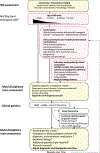Clinical Genomics for the Diagnosis of Monogenic Forms of Inflammatory Bowel Disease: A Position Paper From the Paediatric IBD Porto Group of European Society of Paediatric Gastroenterology, Hepatology and Nutrition
- PMID: 33346580
- PMCID: PMC8221730
- DOI: 10.1097/MPG.0000000000003017
Clinical Genomics for the Diagnosis of Monogenic Forms of Inflammatory Bowel Disease: A Position Paper From the Paediatric IBD Porto Group of European Society of Paediatric Gastroenterology, Hepatology and Nutrition
Abstract
Background: It is important to identify patients with monogenic IBD as management may differ from classical IBD. In this position statement we formulate recommendations for the use of genomics in evaluating potential monogenic causes of IBD across age groups.
Methods: The consensus included paediatric IBD specialists from the Paediatric IBD Porto group of the European Society of Paediatric Gastroenterology, Hepatology and Nutrition (ESPGHAN) and specialists from several monogenic IBD research consortia. We defined key topics and performed a systematic literature review to cover indications, technologies (targeted panel, exome and genome sequencing), gene panel setup, cost-effectiveness of genetic screening, and requirements for the clinical care setting. We developed recommendations that were voted upon by all authors and Porto group members (32 voting specialists).
Results: We recommend next-generation DNA-sequencing technologies to diagnose monogenic causes of IBD in routine clinical practice embedded in a setting of multidisciplinary patient care. Routine genetic screening is not recommended for all IBD patients. Genetic testing should be considered depending on age of IBD-onset (infantile IBD, very early-onset IBD, paediatric or young adult IBD), and further criteria, such as family history, relevant comorbidities, and extraintestinal manifestations. Genetic testing is also recommended in advance of hematopoietic stem cell transplantation. We developed a diagnostic algorithm that includes a gene panel of 75 monogenic IBD genes. Considerations are provided also for low resource countries.
Conclusions: Genomic technologies should be considered an integral part of patient care to investigate patients at risk for monogenic forms of IBD.
Copyright © 2020 by European Society for Pediatric Gastroenterology, Hepatology, and Nutrition and North American Society for Pediatric Gastroenterology, Hepatology, and Nutrition.
Figures

References
-
- Uhlig HH, Powrie F. Translating immunology into therapeutic concepts for inflammatory bowel disease. Annu Rev Immunol 2018;36:755–81. - PubMed
Publication types
MeSH terms
Grants and funding
LinkOut - more resources
Full Text Sources

